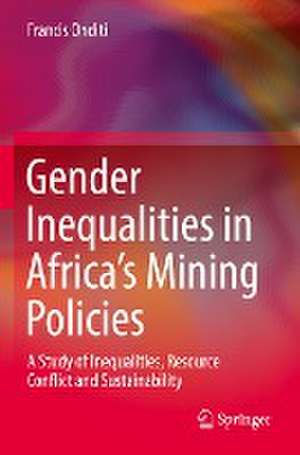Gender Inequalities in Africa’s Mining Policies: A Study of Inequalities, Resource Conflict and Sustainability
Autor Francis Onditien Limba Engleză Paperback – 19 apr 2023
| Toate formatele și edițiile | Preț | Express |
|---|---|---|
| Paperback (1) | 725.61 lei 43-57 zile | |
| Springer Nature Singapore – 19 apr 2023 | 725.61 lei 43-57 zile | |
| Hardback (1) | 731.59 lei 43-57 zile | |
| Springer Nature Singapore – 18 apr 2022 | 731.59 lei 43-57 zile |
Preț: 725.61 lei
Preț vechi: 884.89 lei
-18% Nou
Puncte Express: 1088
Preț estimativ în valută:
138.86€ • 144.09$ • 116.06£
138.86€ • 144.09$ • 116.06£
Carte tipărită la comandă
Livrare economică 17-31 martie
Preluare comenzi: 021 569.72.76
Specificații
ISBN-13: 9789811682544
ISBN-10: 9811682542
Pagini: 239
Ilustrații: XXXI, 239 p. 20 illus., 18 illus. in color.
Dimensiuni: 155 x 235 mm
Greutate: 0.39 kg
Ediția:1st ed. 2022
Editura: Springer Nature Singapore
Colecția Springer
Locul publicării:Singapore, Singapore
ISBN-10: 9811682542
Pagini: 239
Ilustrații: XXXI, 239 p. 20 illus., 18 illus. in color.
Dimensiuni: 155 x 235 mm
Greutate: 0.39 kg
Ediția:1st ed. 2022
Editura: Springer Nature Singapore
Colecția Springer
Locul publicării:Singapore, Singapore
Cuprins
Introduction: A Study of Inequalities & Responses.- PART I: EQUALITARIANISM & AFRICA’S MINING POLICY ENVIRONMENT.- Equalitarianism.- Women’s Invisibility in Mining Ecosystem.- Gender Equality, Mining and Society.- Spatial Inequalities in Mining Spaces.- Mining Policy Frameworks.- PART II: SUSTAINABLE RESPONSES TO INEQUALITIES.- Global and Regional Responses.- Financing Mechanism.- Collaboration and Partnerships.- Solidarity Model and Mining Industry.- Transparency Model and Mining Industry.- Conclusion: Policy Responses and Actions.
Notă biografică
Francis Onditi is Associate Professor of Conflictology and Dean, School of International Relations and Diplomacy, Riara University, Kenya. He was recently enlisted as a distinguished research author and professor of research at the Institute for Intelligent Systems (IIS), University of Johannesburg, South Africa. He is the 2019 recipient of the AISA Fellowship awarded by the Human Sciences Research Council (HSRC), South Africa. Prof. Onditi is a widely published pan-African researcher specializing in the geography of African conflict and evolutionary nature of conflict. He has published more than 70 articles in peer reviewed journals, contributed 20 chapters to edited volumes, and authored/co-edited 6 university level books. His epistemic research affiliation is conflictology specialising in the geography of conflict, institutional evolution theory , regional integration, and civil-military relations. Prof. Onditi’s main contribution is in modelling, thinking uncharted models, and development of theoretical frameworks and concepts, including, most recently, the ‘dominatarian theory of regional integration’, and ‘Technology for Peaceful Society’ (T4PS).
Textul de pe ultima copertă
This book develops a discursive ‘equalitarian’ theoretical framework for studying African mining ecosystem issues and policy interventions. The theory of ‘equalitarianism’ is developed as an alternative to the reductionist approach that has dominated post-colonial debates about the classical jus ad bellum requirements to empower women in development spaces. However, the classical approach narrows the debate down to “women issues,” rather than the ‘whole-of-society.’ As a consequence of this reductionism, women continue to be devalued in the mining sector, characterized by poverty traps, power struggles, and a lack of capacity to engage in large-scale mining (LSM) activities. This book advances principles for a holistic approach, and spells out the implications for women across the mining value chain. Drawing on moral scholarship, the book poses that for women to gain access to strategic spaces in the mining sector, the drive for empowerment must be embedded within ‘whole-of-society’ principles. This book is of interest to scholars researching gender policy, public policy, political philosophy, conflictology, and human geography. It also offers practitioners a guide for evaluating their policy work on mainstreaming gender in the mining sector, presenting options for financing, forging partnership and planning for an inclusive economic development in Africa, and beyond.
Caracteristici
Provides techniques for studying the African mining sector using ta novel Contains toolkits, skills and actionable approaches for addressing root causes of resource-based conflicts Includes detailed case studies from the Western, Eastern, and Southern African regions
